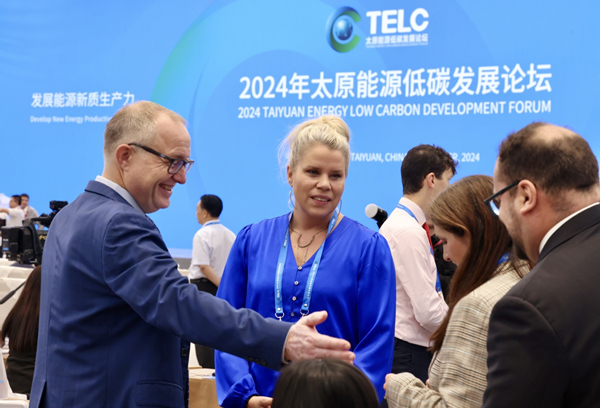Coal-rich Shanxi ramps up clean energy capacity
Updated: 2024-09-12

Experts and industry insiders gather at the 2024 Taiyuan Energy Low Carbon Development Forum in Shanxi province on Tuesday. ZHU XINGXIN/CHINA DAILY
Shanxi, one of China's coal-rich provinces, should step up promoting clean and efficient coal use while expanding renewable energy capacity to ensure long-term stability and development, industry insiders have said.
As the country pushes forward with its commitment to achieving carbon neutrality before 2060, coal-rich regions like Shanxi are essential to balancing the country's energy transition, experts attending the 2024 Taiyuan Energy Low Carbon Development Forum held in Taiyuan, Shanxi province, said on Tuesday.
Shanxi should continue accelerating its energy structure adjustments to support the country's ambitious energy transition goals, said Liu Zhenmin, China's special envoy for climate change.
"The global energy transition represents numerous opportunities for Shanxi and the province should see this as an opportunity to create new industries and seek new growth while supporting the national energy revolution and exploring low-carbon pathways," Liu said.
China has made notable strides in expanding its renewable energy capacity in recent years. By the end of 2023, renewable energy accounted for 51.9 percent of China's total installed power capacity, surpassing coal-fired power for the first time. Renewable energy's share of total power generation rose from 31 percent at the end of last year to 35 percent by July this year, Liu added.
While China has built the world's largest and most comprehensive new energy industry chain, coal remains a dominant energy source, accounting for 56 percent of the country's energy mix.
Despite the transition away from coal, the process must be gradual to ensure the country's energy supply, Liu said.
"Coal will continue to be an essential part of China's energy structure in the foreseeable future and Shanxi should leverage its coal resources as a stabilizing force during the transition and play a key role in maintaining system stability while the country builds a renewable energy-dominated system."
He stressed the importance of boosting Shanxi's renewable energy capacity, particularly in wind and solar, while developing energy storage capabilities to support the increasing share of renewables in the energy mix.
An analyst said Shanxi has rich wind and solar resources, despite the fact that it has been known for its rich coal reserves with a power mix dominated by the black gold for years.
The province's wind and solar energy share in total installed power capacity over the last decade has grown from 6 percent in 2013 to over 38 percent in 2023, and the figure is expected to further grow to 52 percent by 2026, said Zhu Yicong, vice-president of renewables and power research at global consultancy Rystad Energy.
"The province put 8 gigawatts of new solar capacity into operation last year and we expect it to put 9 GW of solar capacity into operation this year and another 11 GW next year," Zhu said.
According to the Shanxi government, the province's installed capacity for new and clean energy power generation by the end of June 2024 reached 64.49 million kilowatts, accounting for 47.22 percent of its total.
Lu Junling, chief economist of the National Energy Administration, said that currently over 95 percent of coal power units nationwide have achieved ultra-low emissions, and China has eliminated more than 100 million kW of outdated coal power capacity over the past decade, reducing pollutant emissions from the power sector by over 90 percent.
By the end of 2023, the installed capacity of non-fossil energy surpassed 1.5 billion kW in the country, while the installed capacity of wind and solar power has increased 10-fold compared to 10 years ago. Clean energy now accounts for 58 percent of the total installed capacity, he said.
Li Chunlin, deputy head of the National Development and Reform Commission, said China has already established a relatively mature and comprehensive policy, infrastructure, and industrial system to support the development of energy transition.
China's high-quality and efficient wind and photovoltaic equipment provide favorable conditions for countries around the world to efficiently develop and utilize renewable energy, he said.

